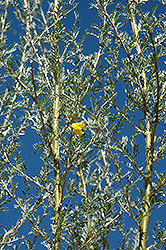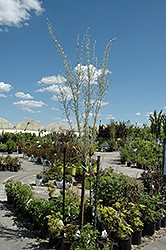It's all about ...
plants

Mongolian Silver Spires Littleleaf Peashrub
Caragana microphylla 'Mongolian Silver Spires'
Height: 10 feet
Spread: 5 feet
Sunlight:
![]()
![]()
Hardiness Zone: 3a
Other Names: Mongolian Peashrub, Caragana
Description:
A fine specimen planting for very harsh or dry locations; tiny, sparkling silver leaves and an upright arching habit; yellow flowers in spring, followed by narrow red seed pods; perfect for a garden composition or foundation planting
Ornamental Features
Mongolian Silver Spires Littleleaf Peashrub features showy yellow pea-like flowers along the branches in mid spring. It has silver foliage with green undersides. The tiny ferny pinnately compound leaves turn gold in fall. The fruits are showy dark red pods displayed in mid summer. The smooth olive green bark adds an interesting dimension to the landscape.
Landscape Attributes
Mongolian Silver Spires Littleleaf Peashrub is an open multi-stemmed deciduous shrub with an upright spreading habit of growth. It lends an extremely fine and delicate texture to the landscape composition which can make it a great accent feature on this basis alone.
This shrub will require occasional maintenance and upkeep, and can be pruned at anytime. Deer don't particularly care for this plant and will usually leave it alone in favor of tastier treats. Gardeners should be aware of the following characteristic(s) that may warrant special consideration;
- Spiny
Mongolian Silver Spires Littleleaf Peashrub is recommended for the following landscape applications;
- Accent
- Hedges/Screening
- General Garden Use
- Windbreaks and Shelterbelts
Planting & Growing
Mongolian Silver Spires Littleleaf Peashrub will grow to be about 10 feet tall at maturity, with a spread of 5 feet. It tends to be a little leggy, with a typical clearance of 3 feet from the ground, and is suitable for planting under power lines. It grows at a medium rate, and under ideal conditions can be expected to live for approximately 30 years.
This shrub does best in full sun to partial shade. It prefers dry to average moisture levels with very well-drained soil, and will often die in standing water. It is considered to be drought-tolerant, and thus makes an ideal choice for xeriscaping or the moisture-conserving landscape. It is not particular as to soil type or pH, and is able to handle environmental salt. It is highly tolerant of urban pollution and will even thrive in inner city environments. This is a selected variety of a species not originally from North America.

